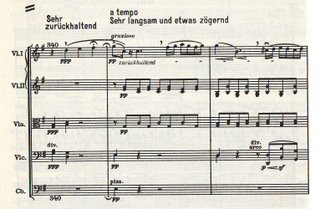This Magic Moment (one in a series)

Mahler, Symphony No. 4, first movement, mm. 340-341
There's a wonderful jest here that I'd never thought too much about until last night, when Michael Tilson Thomas played it up with a vaudevillean's mastery of timing. This juncture comes less than a dozen measures before the end of the movement, and there's no question in the mind of even a first-time listener that the movement has completely run its course. So what's with the slow lead-in, yet again, to the main theme? Are we really going to go through the whole thing one more time?
The false reprise is an old joke — a little like some time-honored vaudeville routine, in fact — that was a particular favorite of Beethoven, based on various ideas of Haydn. You feign a return to a theme that you should be through with, then suddenly yell "Gotcha!" and bring the music to a sudden halt; the classic cases include the scherzo of the Ninth Symphony and the finale of the Violin Concerto. It only works if you can assume listeners have some familiarity with the formal conventions and can spot when you're doing something odd, like bringing back a theme one too many times.
Mahler doesn't quite have that assurance at his disposal — his formal practice is too idiosyncratic — but he has something amost as good. He has audiences who know their Beethoven. And the slooooow rise from D to E to F-sharp with a fermata, all of it Sehr zurückhaltend, is there to give us time to remember the old joke we've known from our cradle. It's an exquisitely knowing tease — will he? won't he? — and with hindsight the main theme suddenly seems to have been reverse-engineered for just this moment.
But Mahler also relocates the punch line in a clever, and oddly sweet-tempered, way. When Beethoven pulls this joke, he'll start a theme verbatim, then stop abruptly; and although it's funny, there's an implied reproach to the listener for being so easily taken in. Mahler gives the listener credit for not being so gullible. He knows that the three rising notes in m. 340 are his only chance to play with our expectations; when the C-major harmony hits at the beginning of m. 341 the game is up, and there's a lovely, warm moment of complicity.

1 Comments:
My favorite false recap is the horn in the first movement of Beethoven's third...always sounds like the player blew an entrance. ;)
Post a Comment
<< Home